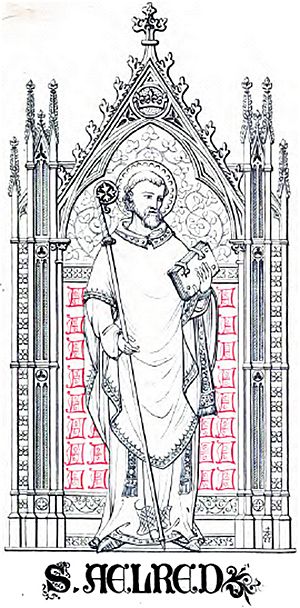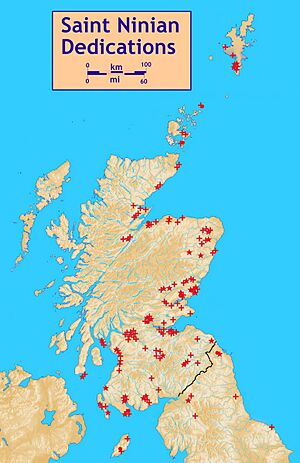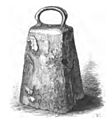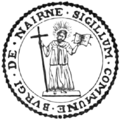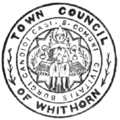Ninian facts for kids
Quick facts for kids SaintNinian |
|
|---|---|
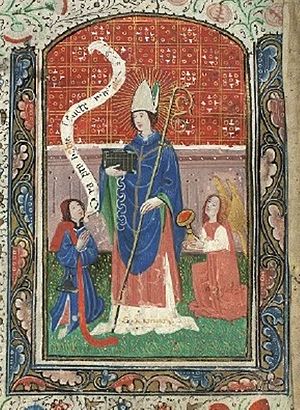
Saint Ninian as intercessor ("Ora pro nobis, Sancte Niniane"). Donor portrait in the Book of Hours of the Virgin and Saint Ninian, 15th century
|
|
| Apostle to the Southern Picts | |
| Died | AD 432 |
| Venerated in | |
| Major shrine | Whithorn Priory |
| Feast | 16 September |
| Attributes | Episcopal, Bell of St Ninian |
Ninian was an early Christian saint. He is first mentioned in the 700s. He was a missionary who helped spread Christianity among the Pictish people in what is now Scotland. Because of his work, he is known as the Apostle to the Southern Picts.
Many places in Scotland and parts of Northern England are named after him. In Scotland, he is also called Ringan, and in Northern England, he is known as Trynnian.
Ninian's main holy place was at Whithorn in Galloway. This place is linked to the Candida Casa, which means 'White House' in Latin. We don't know much for sure about his life or what he taught. Historians are still trying to figure out the exact details of who Ninian was.
Contents
Who was Saint Ninian?
Saint Ninian is believed to have been a very early Christian missionary. He worked among the Southern Picts. These were Pictish people who lived south of the Mounth mountains in Scotland.
Some old writings suggest that these Picts were Christian before Ninian. Later, they might have stopped following Christianity. Ninian is said to have helped them become Christian again.
The area of Galloway, where Ninian's shrine is, had a strong Christian presence by the 500s. Later, in the 700s, a new bishopric (a church area led by a bishop) was set up in Whithorn. This was part of the Northumbrian kingdom's efforts to spread Christianity. The name Whithorn comes from an old English name meaning 'white house', just like Candida Casa.
Historians are still researching to find out more about the real person behind the stories of Ninian. Some scholars think he might be the same person as Finnian of Moville, another early Irish saint.
Traditional Stories of Saint Ninian
The earliest stories about Ninian come from writings in the 700s. These include a short mention by the monk Bede and a poem about miracles. Later, a longer story about his life was written around 1160 by Ailred of Rievaulx. In 1639, James Ussher also wrote about Ninian.
These old writings tell us some personal details about Ninian. However, there isn't strong historical proof for all of them. Also, the people who wrote these stories sometimes had their own reasons for telling them.
Here are some of the traditional beliefs about Ninian:
- He was a Briton who studied in Rome.
- He set up a church center called the Candida Casa in Whithorn.
- He named this church after Saint Martin of Tours.
- He helped convert the southern Picts to Christianity.
- He is believed to be buried at Whithorn.
Some stories add that he met Saint Martin in person. Others say his father was a Christian king. One story even says he died in Ireland in 432 AD. The date of his birth is often linked to Saint Martin, who died in 397 AD.
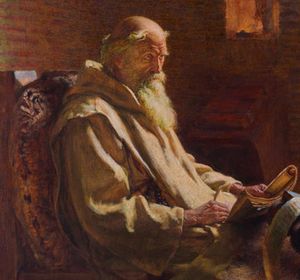
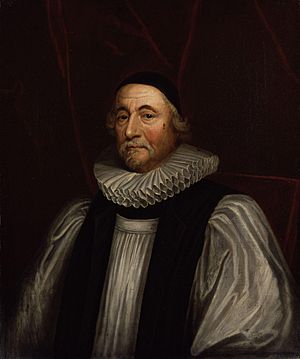
Places Named After Saint Ninian
Many places are named after Saint Ninian. This shows how much people respected him and the good deeds he was said to have done. Most of these names appeared in the Middle Ages, after Ailred wrote his story about Ninian.
You can find places named after Saint Ninian across the lands of the ancient Picts in Scotland. They are also found throughout Scotland south of the Firths of Clyde and Forth. You'll also find them in Orkney and Shetland, and in parts of northern England.
- St Ninian's Cathedral is an Episcopal church in Perth.
- St Ninian and Triduana's Church, Edinburgh is a Roman Catholic church in Edinburgh.
- On the Isle of Man, some places are named after Ninian. This is from a time when Scotland had more influence there.
- In East Donegal and Belfast in Ireland, there are also places named after him. This shows the strong connection between Scotland and Ulster.
- You can also find dedications in other parts of the world with Scottish heritage, like Nova Scotia in Canada. St Ninian's Cathedral is in Antigonish, Nova Scotia.
Interestingly, there are not many places named after Ninian in the Scottish Highlands and Isles.
In modern times, new churches are still being dedicated to Saint Ninian. For example, St Ninian and Triduana's Church in Edinburgh was built in 1932. St Martin and St Ninian Catholic Church in Whithorn was built in 1959–60.
Saint Ninian's Feast Day is celebrated on 16 September in Scotland. He is also honored on this date in the Church of England and the Episcopal Church.
Images for kids
See also
- Isle of Whithorn
- St Ninian's Isle
- St Ninian's Well
- Vita Sancti Niniani ("Life of Saint Ninian")


